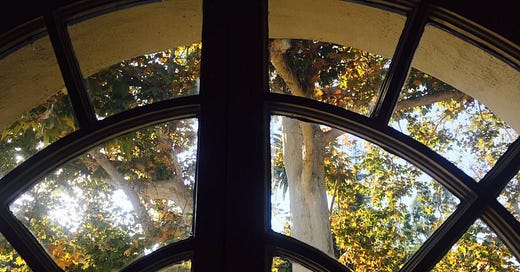1.
By the time the Tale of Genji was written in 1021, official contact with China had long ended— and Japan was in one of its inward-facing periods.
Except it wasn’t—since the people of the Heian court lived and breathed Tang China. Writing Chinese poems and collecting art from the Continent, the lives of the Heian elite were perfumed in Tang sensibilities.
And you can find this obsession in every chapter of the novel.
This week I’ve been reading and thoroughly enjoying Michael Wood’s literary travelogue In the Footsteps of Du Fu. An historian and documentary film maker, he does a lot of these kinds of “in the footsteps” books and has it down to a science.
But why Du Fu?
Early on, he makes the point that the poet was born at the precise moment of lift-off of the glorious Tang, considered to be one of China’s great ages of cultural and literary flowering. While the Japanese preferred Bai Juyi, I think the rest of us would agree with Wood that Du Fu is not only China’s greatest poet but one of the world’s.
Anyway, that is my opinion—I love Du Fu.
But he is very hard to translate. That said, I’ve always thought that one of the benefits of studying Japanese is you can —as a kind of side-line—approach Chinese poetry through a Japanese lens. This is helpful—especially in the case of Du Fu, whose poems are a bit hard to nail down.
“An Evening Banquet at Mr. Zuo’s Country House” describes a time when the poet was young and attended a banquet at an aristocrat’s villa in the countryside. As the darkness unfolds, he can hear the sounds of spring water flowing outside as the fragrance of flowers fills the air. More sounds arrive from the plucking of a qin and sensations depicted in the dampness of the dew. Above, he sings, is a constellation of stars.
Meanwhile inside, much wine is drunk as precious books and swords are appreciated. Mr. Zuo is a military man and a scholar. Later poems are composed and recited. Finally, folksongs are chanted in the dialect of the southern Yangzi River delta (Jiangnan).
It is a magical evening —but what does the poet recall most of all? It is the story of a Fan Li, who lived during the late Spring and Autumn period, in the 5th century BCE. After helping the king win a decisive victory over his enemies, Fan Li refused all rewards and instead boarded a small boat and sailed away, living a live of peaceful seclusion with his wife Xi Shi, one of the great beauties of the time.
Ah, the quiet life…..
I based my translation on: 『新釈漢文大系 詩人編6 杜甫 上』and got really lucky to find this detailed examination of the poem online (page 2).
夜宴左氏荘(杜甫)
風林纖月落,衣露凈琴張。
暗水流花徑,春星帶草堂。
檢書燒燭短,看(一作說)劍引杯長。
詩罷聞吳詠,扁舟意不忘。
(Japanese style)
風林繊月落,衣露浄琴張。 暗水流花径,春星帶艸堂。
検書焼燭短,看剣引盃長。 詩罷聞呉詠,扁舟意不忘。
A slender moon sinks into trees swaying in the wind,
To the pure tones of a zither, our clothes dampened by dew.
In darkness spring water winds a path perfumed by flowers,
Embracing the thatched roof is a constellation of spring stars.
Looking things up in books as the candles slowly burn down
I appreciate a fine sword as another cup of sake comes around
We read our poems aloud, then listen to Wu songs being chanted
Even now I can’t forget someone mentioning Fan Li’s small boat–
It recalls the Six Dynasties poet Tao Yuanming and that line from his poem about plucking chrysanthemums by the eastern fence:
採菊東籬下
Here it is again:
飲酒詩 陶淵明
結盧在人境 而無車馬喧
問君何能爾 心遠地自偏
採菊東籬下 悠然見南山
山氣日夕佳 飛鳥相與還
此還有真意 欲辨已忘言
Drinking Wine (#5)–Tao Yuanming
I’ve built my house where others dwell
And yet there is no clamor of carriages and horses
You ask me how this is possible– (And so I say):
When the heart is far, one is transported
I pluck chrysanthemums under the eastern fence
And serenely I gaze at the southern mountains
At dusk, the mountain air is good
Flocks of flying birds are returning home
In this, there is a great truth
But wanting to explain it, I forget the words (my trans)
Both poems, I think, are about the wisdom of being easily satisfied—or to be someone 易安 "easily contented." It sure makes things easier.
This concept—and that line about picking chrysanthemums has become the great touchstone of my life….
Posting about Du Fu tomorrow at 3 Quarks Daily.
Note
Candles were sometimes used to time a poetry contest. Fan Li’s boat: refusing rewards for his service to the state, Fan Li (ca. fifth century BCE) climbed into a little boat and sailed away. Already the alternative life makes its appearance.





Once again the trees outside my window
Raise their thoughts of leaves to see
Inside my own reverie. Tiny enough,
Almost unseen, the shadow of my love
Climbs a branch whose memory sighs.
This line held the most meaning for me.
欲辨已忘言
As writers, we want to give form to our sensations, yet those feelings are like ghosts that fade the more we strain to see them.